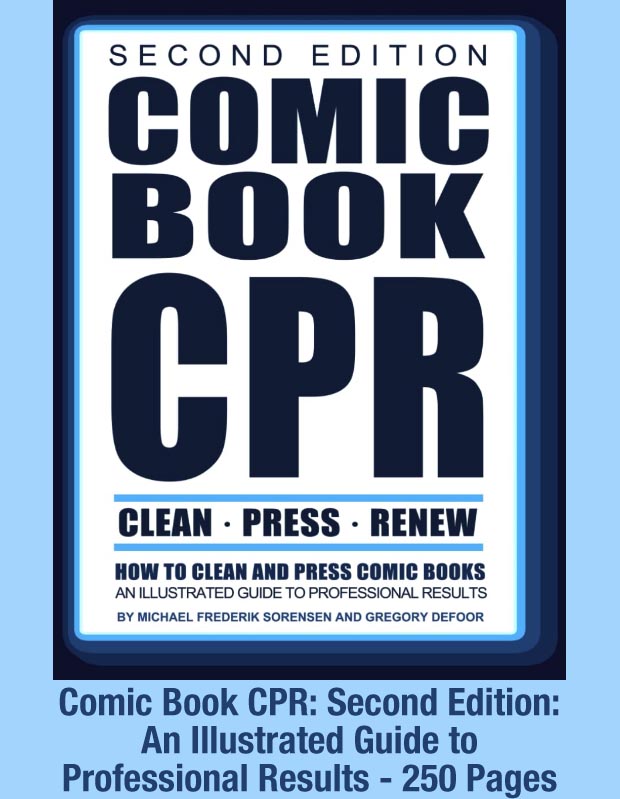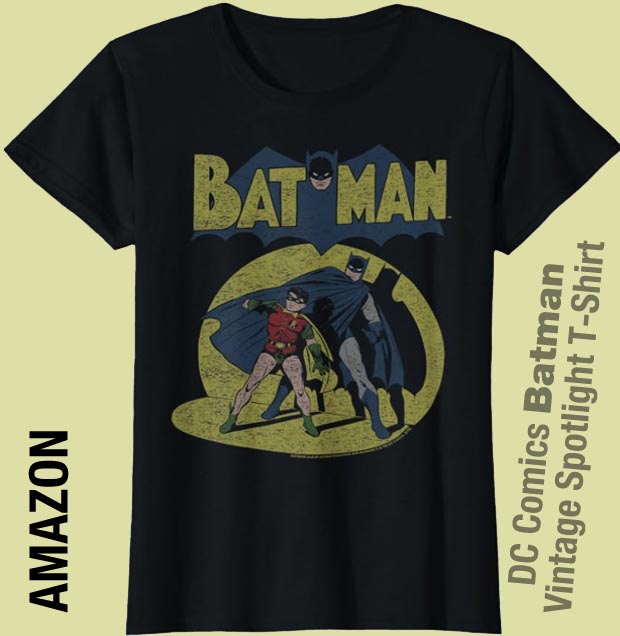Wonder Woman 84 Review
Too long and too invested in its faery tale morality tale to give proper attention to Diana Prince
Patty Jenkins' Sequel
What does Wonder Woman 84 remind me of? In 1944, movie producer Val Lewton made a sequel to his amazingly successful psychological horror film of 1942, Cat People. The sequel, titled Curse of the Cat People, did okay box office but was not a phenomenon like the original film which supposedly made so much money for RKO that it saved the studio from bankruptcy [1].
Unlike the earlier film which was about the maybe/maybe-not transformation of Simone Simon into and out of a female panther, Curse of the Cat People was a relatively gentle fairy tale about family dysfunction and the plight of a little girl who has something like a phantom guardian angel (Simone Simon, again as Irena Dubrovna, as in the original Cat People movie) who comforts and provides help when the tension in the movie rachets up too high. In a commercial sense, it is as if producer Val Lewton [2] deliberately sidestepped the typical sequel route and went for a tale that would have nothing to do with the expectations of his built-in audience. He was instead addressing things that he himself felt were important about children and their relationship to parents who are too busy to pay proper attention to their upbringing, which is far removed from the scare of Irena Dubrovna changing into a cat-person and slaying her enemies.
And that's the problem between Wonder Woman of 2017 and Wonder Woman 84, one is a superhero movie, the second is a quasi-superhero movie but the core is a fairy tale for kids and written with the feel of an episode of a TV show.
Comic book sensibilities
Not that the film ignores comic book sensibilities. Gal Gadot has a long sequence at the beginning of the film in which she battles bad guys in a 1984-era mall, and there are other superhero heroics (with a lot of good and also not-so-convincing stuntwork) from both her and from The Cheetah (Kristen Wiig) who undergoes a transformation over the space of the movie not too much different from what is implied in Lewton's Cat People, a woman becoming a lethal feline, but the true action of the script [3] in Wonder Woman 84 is about the mystical powers of a "golden-yellow citrine gemstone" that grants wishes to whoever is holding it. It's like a genie in a bottle, and that means people want to steal it for themselves, but the necessity of gripping the rock is soon changed when not-much-of-a-villain Maxwell Lord (Pedro Pascal) uses a wish to turn himself into the "wishing stone," though he looks exactly the same afterward, but now can wield its power by getting other people to touch him and to wish for things (most of which then boosts the previously destitute Maxwell Lord's fortunes). "Be careful what you wish for" is the main underlying lesson of this movie, and there are some mentions made in the dialogue of the famous 1902 W. W. Jacob's short story The Monkey's Paw, which is about wishing for things you'd be much better off not obtaining.
Mysticism and the occult have always been either on the fringes or in the direct heart of superhero stuff, and Wonder Woman 84 is no different, and like most of the rest of the genre, no effort is made to explain where this power is coming from, whether God, gods, a Devil, devils, or whatever, instead it just is, and paying no attention to the "science" is the expectation of the writers, because the whole focus here is on how you use powers, not how or where they come from.
Resurrecting Steve Trevor
And that's another area where the film is questionable, with Diana Prince given a chance to live again with the dead Steve Trevor (Chris Pine) who is resurrected via using another man's body, and as Steve and Diana get to know each other again in 1984 (the previous Wonder Woman movie took place during the years of World War I), it is entirely at the expense of a hijacked body that belongs to another person whose personality and identity is apparently pushed into some unknown limbo. Eventually Steve Trevor confronts this crime (what else could it be?) and this is softly pedalled as a lesson for Diana to learn (much like the lesson in ethics given a very young Diana in the flashback sequence about an athletic event back on Diana's home island of Themyscira where she, well, cheated. A bizarre project of Wonder Woman 84 is to reduce Diana Prince instead of building her up, and the charmingly-innocent person Gal Gadot played in the previous film is almost submerged in this film into a kind of character who only functions to keep the plot moving forward because the faery-tale story is more important to the filmmakers than is the main reasons we're here: the character of Diana Prince.)
Maxwell Lord
But it is Maxwell Lord who is given the hardest lesson (such as it is) in wishing for the wrong things, and in the conflict between his out-of-control wishing he threatens to eventually destroy the world. Such a tale can work either as a fairy tale or as a superhero movie, and director Jenkins does make a pretty good crisscross between the two for awhile, as long as you think this really is a fairy tale. The astonishing amount of destruction the film portrays isn't held to account against the sympathetic Maxwell, and the dead are simply unimportant and the massive property damage isn't worth a worry either to the filmmakers. If Wonder Woman 84 was meant to be taken even partially more seriously, it would be a horror-superhero movie, and the hint of The Monkey's Paw would have been given full flower with a corpse Steve Trevor coming back to the lovelorn Diana, and the feminist avenging force of The Cheetah wreaking a brutal revenge through the Capitol of the United States. But instead, dishonestly, unwishing makes everything better, so nighty-night, kids.
Unrealistic Washington DC
And that is where the next-to-last of my complaints about this movie lie, how it portrays the District of Columbia. Where are all the black people? I worked and lived in Washington DC in 1984, and Jenkins' movie drastically underestimates the demographics.
A lot of attention is given to the parade of fashion but outside of that a lot is wrong about the recreation of the time frame, including how it portrays street crime with people walking at dark in the wrong places in town (such as along the tidal pool area, as if the screen characters are headed home. There's no buildings down there for anyone to live in. It would be a good place to get mugged or murdered at dusk in 1984 though, if you had such an insane ambition.)
Even the behavior of the people in the museum where The Cheetah is working isn't realistic, Washington DC is unique in that amid the Federal Government and the vast network of museums, polite etiquette rules over a lot of these institutions and what is depicted in the film might be dead-on activity for Los Angeles in 1984, but it simply isn't a real world look into the District in 1984, or in the current year, either. You can get yourself murdered in DC which has a very competitive homicide rate, but the daytime world of commuters filing into the huge Federal buildings, and the buildings that house the innumerable non-profits, associations and other entities that use the Capitol as their headquarters is a very different story. The place is truly an international city, a kind of 21st century Bablyon protoype in the sense of how flavored it is by all of the other nations of the world, and WW84 just doesn't grasp this at all, we could be in any generic urban city of the USA.
Too long
A final complaint is the length of the movie, it is simply too long. The beginning "Diana is a cheater" segment is long, and that sets a standard for the rest of the film which just can't come to grips with action film dynamics which require speed because the genre is literally about action. I take it that the story theme from the writers is such a proud center of the project so that it got too much care and attention and swamped the story with repetition to make its points, over and over. How many times do we need to see Maxwell Lord weeping so that we finally cry 'uncle' and admit yes, he's a soulful man underneath all that greed, failure and self-embarrassment.
More recent superhero movies have been steadily moving into a goofy area where the heroes and the villains all have backstories that explain away their mad behavior and make it so that there's just isn't really anyone who is a bad-guy any longer, no matter how many people they kill. We do have an exception with the loathsome would-be assailant who assaults Kristen Wiig's character twice in Wonder Woman 84, because yes, he gets a deserved comeuppance that, as far as the film is concerned, is almost guilt-free, but then turns it on a dime when a homeless man nearby sees the interaction of The Cheetah kicking the rapist down the street and recognizes the female assailant as his day-to-day subscriber who always provides spare change, and embarrassed but hard-faced, Wiig's character stops the pummeling and exits with a warning of "mind your business," to the man she previously cared about who stands watching, perplexed. It gives us a nice gradation of the change in the character from the sweet but malfunctioning gemologist Barbara Minerva to this steadily more strident and dangerous person who is taking her place as a result of getting her wishes granted, and it fits perfectly in the fairy tale story of Wonder Woman 84, because in reality the homeless person of Washington DC in 1984 would have rushed over to rifle the pockets of The Cheetah's victim lying on the asphalt instead of acting as a moral judge, and this is how badly afield this faery tale gets and how ultimately dishonest it is.
What I wanted from the film was simple: more Gal Gadot and more fast-footed action, and for the Cheetah to play a more important part than the tragic-bad guy Max Lord who would have been more effective by doing and saying more with less screentime.
Related:
FOOTNOTES
1. RKO was in dire straits after sinking too much money into the middling-success of Citizen Kane which produced a lot of positive, to put it mildly, reviews, but not the equivalent in ticket sales.
2. Unlike the average film producer Val Lewton exercised such tight control over the making of his films it is one of the few instances where a series of movies – he made eleven for RKO – are better listed thematically and stylistically according to their producer than by their various directors and writers. Lewton actually wrote the final scripts for his films, often loaded with art direction notes, further adding to his control over the final realized product, though he made it a point to not interfere with the director on set. Lewton had a previous career as a script-doctor and literature advisor for Hollywood one-man-studio David O. Selznick. Before that Lewton was a journalist and writer, producing nine novels and one book of poetry.
3. Writer credits on the film go to Patty Jenkins, Geoff Johns, Dave Callaham and based on the characters from William Moulton Marston.
WONDER WOMAN 84 - AMAZON STREAMING
Wonder Woman:
Wonder Woman 2017 Movie Review
A Cinematic History of Wonder Woman
Lyle Waggoner, the original TV Steve Trevor
Gal Gadot, to be or not to be Cleopatra
Wonder Woman - Gal Gadot 2017 - Amazon Streaming HD
DCU: Wonder Woman Commemorative Edition MFV (Blu-ray)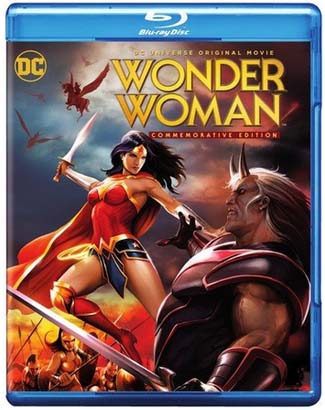
Comic Book Movies
The Coming Comic Book Movies 2025-2026
Top Earning Comic Book Superhero Movies
Screen Reviews
Thunderbolted - 2025 - what's wrong with this movie?
Review of Daredevil Born Again
Captain America: Brave New World
Short Review: She-Hulk, Attorney-at-Law
Fast review: Dungeons and Dragons: Honor Among Thieves
Dungeons and Dragons Honor Among Thieves – a Film with antecedents – Harry Potter plus Guardians of the Galaxy plus Lord of the Rings, etc.
Fast review: Dungeons and Dragons: Honor Among Thieves
Dungeons and Dragons Honor Among Thieves – a Film with antecedents – Harry Potter plus Guardians of the Galaxy plus Lord of the Rings, etc.
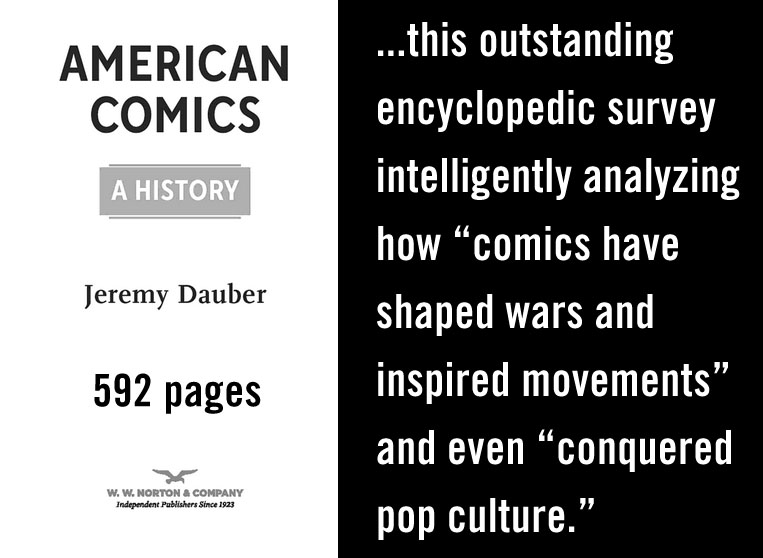
Original Page November 2019
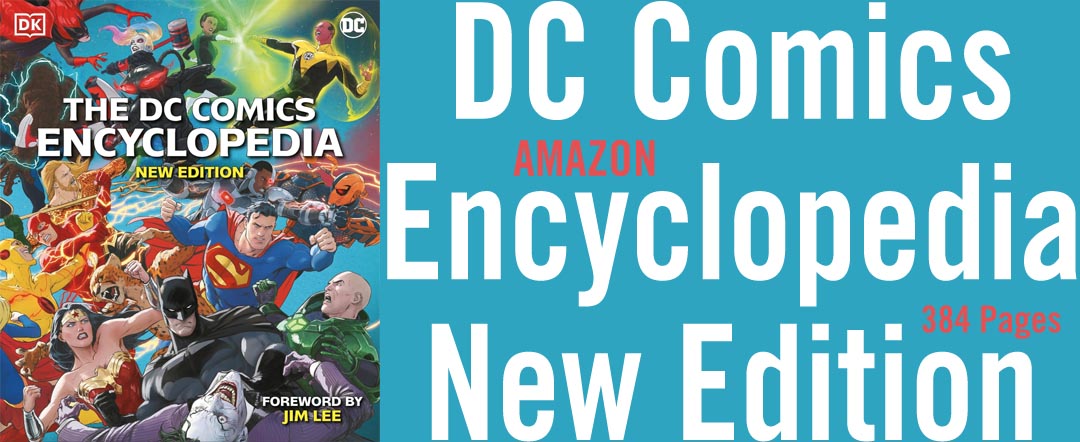
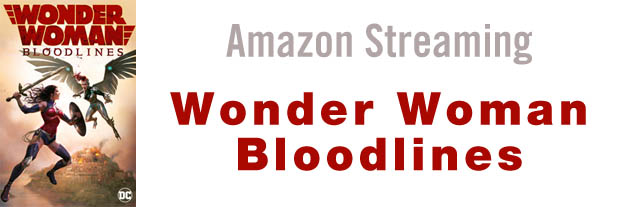 Wonder Woman: Bloodlines
Wonder Woman: Bloodlines